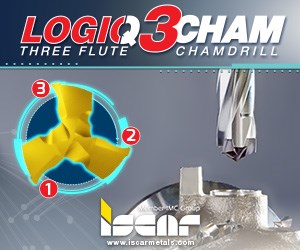PCD Face Milling System’s Diameter Cuts Large Parts in Fewer Passes
The KBDM polycrystalline diamond (PCD) face milling system from Kennametal is designed for high-volume machining, with standard sizes ranging from 2.5" to 8.0" (63 to 200 mm) and cutter diameters ranging to 21.5" (550 mm).
The KBDM polycrystalline diamond (PCD) face milling system from Kennametal is designed for high-volume machining, with standard sizes ranging from 2.5" to 8.0" (63 to 200 mm) and cutter diameters ranging to 21.5" (550 mm). According to the company, these wide diameters enable the machining of large components, such as automotive components, in a single pass. Options for integral shank bodies, HSK mounting and left-hand cutter rotation are available, as well as special edge preparations and nose radii.
This face milling platform uses a fine-pitch aluminum body with wedge-style clamps and adjustable pockets. A variety of PCD inserts are available, from mini-tips for light finishing cuts to full face wipers, standard cartridge inserts, and ½" (12.7-mm) axial cutters for heavy roughing and shoulder cutting.
In the case of automotive manufacturing, the company reports that this tool system can achieve finishes of 2 to 3 microns Ra and long tool life. Additionally, Kennametal has developed two PCD grades to meet the needs of automakers using their own proprietary aluminum alloys. The KD1400 uses small diamond grains and offers good chipping resistance and wear attributes, while the KD1425 uses large diamond grains, improving abrasion resistance and thermal stability and only slightly lower performance where chipping is a concern. Both are capable of very high cutting parameters, the company says; depending on the alloy and setup rigidity, Kennametal recommends an initial cutting speed of 3,280 fpm (1,000 m/min.) and feed rates of 0.004" per tooth (0.01 mm), although higher values are possible.
Related Content
-
How to Mitigate Chatter to Boost Machining Rates
There are usually better solutions to chatter than just reducing the feed rate. Through vibration analysis, the chatter problem can be solved, enabling much higher metal removal rates, better quality and longer tool life.
-
A New Milling 101: Milling Forces and Formulas
The forces involved in the milling process can be quantified, thus allowing mathematical tools to predict and control these forces. Formulas for calculating these forces accurately make it possible to optimize the quality of milling operations.
-
All-Around Mill Improves Productivity and Cost for Valve Job
Adopting a mill with a double-negative rake and pockets compatible with multiple insert geometries enabled Progressive Metal Service to increase feed and lower scrap rates for a valve.

.jpg;width=70;height=70;mode=crop)











